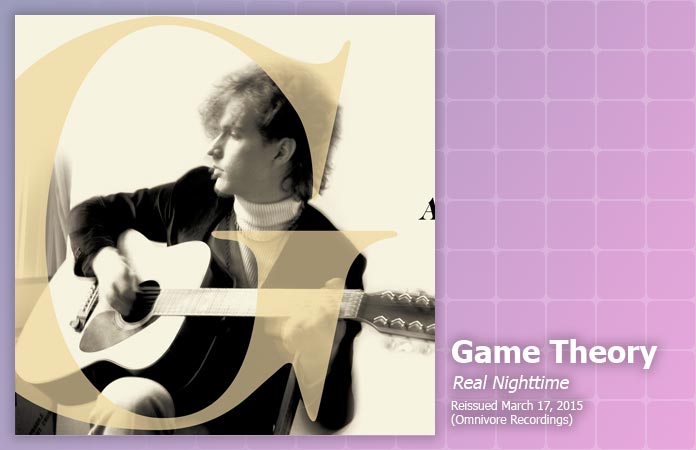Music Review, Game Theory, Real Nighttime
Published on March 20th, 2015 in: Current Faves, Music, Music Reviews, Reissues, Retrovirus, Reviews |The earlier Game Theory EPs gave us a Portrait of the Artist as a Young Band. As the band tried on and discarded aesthetic approaches and made basement recordings on less than ideal equipment, a musical persona began to emerge: sunny Californian pop with fillips of experimentation and flashes of intelligence, pitting melancholy lyrics against jangly melodies. On Real Nighttime, the band’s first official LP, Game Theory’s sound comes into sharper focus.
The hallmarks of Scott Miller’s songwriting make themselves known within seconds of the needle drop. Listeners will find themselves all but singing along with “Waltz the Halls Always,” the album’s second track, but the pithy, bittersweet lyrical epigrams (“all your foreign words translate in English to ‘misery’”) may come as a surprise to those only casually paying attention. Miller’s lyrical narrative of the hapless, introspective romantic deepens on Real Nighttime, his barbs vying with lovelorn observations and expressions of unrequited love.
Musically, Real Nighttime is of a piece with the dB’s, the Three O’Clock, and other post-Big Star jangle pop bands who made their name in the early 1980s college-rock scene. Throughout his career, Miller’s experimental instincts vied with his preternatural ability to craft a perfect pop song. That aspect of his interests is less on display here, but it comes through here and there, as on Side B’s angular, synth-driven “Rayon Drive,” or “Friend of the Family,” which jettisons several time signatures in its depiction of a road trip gone wrong. (Fans of Scott Miller’s later work will recognize “Here Comes Everybody” from its samples on the opening tracks for both Lolita Nation and Plants and Birds and Rocks and Things.)
Real Nighttime also represents the final recordings of this lineup of Game Theory. On this album, the quartet bristles with confidence as they run through Miller’s ambitious pop songs. One new member of the Game Theory team comes on board, though: Mitch Easter, then known for producing REM’s first breakthrough albums, works with Game Theory for the first time on this album. While the synth lines and Miller’s tenor head voice give the album a slightly high-endy sound, Easter balances the trebly aspects of Game Theory’s songs with a well-recorded low end.
Omnivore’s reissue shows loving attention to detail. In addition to restoring a few musical quotes (like the “Stairway to Heaven” fadeout on “24”) that got left off the previous reissue, they include several live tracks made when this iteration of Game Theory toured. The 1970s pop covers—such as a lurching, noirish “Baker Street” and a puckish vamp on Queen’s “Lily of the Valley”—showcase Miller’s omnivorous musical appetite. Their original tracks don’t work as well in a live setting, but Miller’s game solo performance of “Metal and Glass Exact” shows his willingness to experiment.
All in all, Real Nighttime is a winner of a reissue, and has whetted my appetite for the next few Game Theory releases.
Real Nighttime was reissued by Omnivore Recordings on March 17.

Time limit is exhausted. Please reload the CAPTCHA.